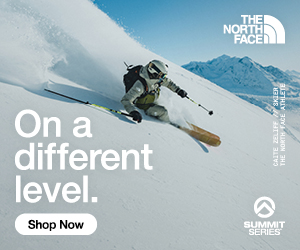Mike Douglas, Jen Hudak and Pip Hunt talk badasses, sexism, snow media & the exciting progression of women’s skiing.
Women and men ski differently but it doesn’t mean one is better than the other. It just means we are different. Yet women still struggle to be recognised on the world sponsorship and media stage in the same way as the blokes.
When Angel Collinson came along and won ‘line of the year’ at the Powder Awards in 2015 it was ‘one small step for women skiers, one giant leap for womankind’ in an industry where balls are usually best. I’d like to say that she showed she had them but that reference alone infers that all women want to be is as good as men in the same way that ‘you ski like a girl’ is supposedly an insult to men.
Neither are true yet those throw away phrases are so ingrained in a daily snow language amongst lads, that it understandably deters young women from continuing in some sports.
“I think for girls in skiing and girls in sports actually, a lot of it is social” says professional skier Pip Hunt, one of the names behind Shifting Ice Changing Tides, an all female documentary on women skiing first descents in Greenland.
“You really want to be able to feel like you connect with the women that you’re doing it with, the girls that you’re doing with it and if you’re in a situation where you feel really isolated because there are not a lot of other girls or you feel like you’re getting bullied then it becomes a lot more challenging to want to stick with that sport. If you don’t want to be one of those girls who hangs with the boys then a lot more girls are bailing on skiing earlier.”

Girls have a right to feel despondent about skiing as a profession. The stats are far from inspiring when it comes to who gets the most sponsorship dollars, who gets the most prize money, who gets coverage in the media. Even when you are world champion you’re not guaranteed the coverage you would think your talent would ensure over the prettier girl willing to promote her beauty. Not that it’s the pretty girls fault either.
“I think a lot of women need to create media themselves and I think you need to be a go getter and really get out there and put yourself out there” explains Hunt.
“I’m not a huge fan of the social media in that regard but I think unfortunately that’s where marketing is going. So, if you want to be a part of it you do have to play that game.
“I also think that both editors and female athletes need to be better about working together to get women in the media. I find that a lot of women can be just more timid, they don’t want to feel like they’re harassing anybody or sending too many emails or that maybe what they’re doing isn’t interesting enough.
“But we need to recognize that what we’re doing is impressive and it is better than 99 percent of what most women are doing on their skis. The editors need to be willing to publish our stuff but we also need to be willing to put ourselves out there to get the media out there.”
There’s enough research published over the years that suggest that women who do go after what they want are then judged harshly by both genders and that women’s ‘please like me gene’ then means they wilt rather than blossom in the face of that judging. The nuances for girls wrestling with appearance, body image and nice girl status in a world of selfies and internalised sexism creates a mine field for any female trying to make it in a sports world that values men over women and appearance over talent.
One female skier however may well be breaking those ice ceilings on her own and creating a path for other women to do the same. That skier is Angel Collinson.
“I was on the judging panel for the Powder Magazine video awards this year, which is like the big Oscars of skiing. And the line of the year was won by Angel Collinson” says Salomon Freeski TV producer and professional skier, Mike Douglas.
“I voted for her. I took gender out of it, and I just looked at the quality of skiing.
I’m quite excited by what I’m seeing from women skiing right now, because I see, first of all, skiing at the highest level. I would say a long time there was a big gap between what the men were doing and what the women were doing. And I’ve seen that gap closing now.
Angel skied the best, most courageous line of the year. I say let’s pick the most qualified people for the jobs; and if the best skier on the mountain on any given day is a woman, awesome.”
Douglas has a great point but it is not one shared by all especially in a judged sport where the fastest, the highest, the most difficult tricks are the ones that count despite the level of physical risk to the male and to the female athlete being the same. A risk that can, and has, included death.
The issue for women is not skiing or snowboarding like men but doing it their way, not the way men want women to do it to suit them, their advertisers or their eyes. Then these women need to be acknowledged for this difference in a very public way, not because of gender, but because of interest. It is a chicken and egg thing for ski media as what comes first, the media pushing the integration of both genders across pages and films so the audience is ‘trained’ to want it OR the audience pushing the media to do it first?
“Who is responsible? Is it the media, is it the females, is it society? And I think the answer is we are all responsible” says former world champion halfpipe skier, Jen Hudak, when asked how to get women the recognition they deserve in the ski world.
“If women don’t want to be exploited. And they don’t want these images of themselves being put in the media. Then don’t produce images of yourself in a bikini. That’s pretty basic step number one. Some women are OK with it and are comfortable with it. Well then that’s their prerogative and that’s fine.
At which point it becomes the media’s responsibility. Because if there are women who are willing to put themselves out there in that way but they’re not necessarily the best in the field then (the media needs to) resist the urge to give them all of the attention and instead put the attention on the women who are changing the world and changing the sport and pushing the limits in what they’re doing.”
“I don’t think women need to do edits like men do” says Hunt who is also an instructor with Rippin Chix.
“I think that they can do something different and innovative and interesting. There’s been more and more girls this year who have, like Lexi DuPont and Amie Engerbretson, they’re all putting edits out there with a little bit of their own flavor and I think this is the first season I’ve really seen that happening.”
At the end of the day for Jen Hudak it’s about giving women, girls in particular, the feeling of confidence that they can, really do anything they want, and by doing that first on skis and seeing role models within the media that do that too.
“Being in a society that is so image obsessed, if all I valued my body for was how it looked, I would be extremely miserable. And so being on skis and really doing any sport has given me a new appreciation for what my body can do not just what it looks like. And I think that’s why I want to support women so much.
Because we all struggle with those feelings of self-doubt and insecurity and feeling what your body can do on a pair of skis. And doing something for the first time that you never thought was possible is just such an incredible feeling.
So I just want more women to be able to feel good about themselves in that way.”
Read more: Adrenaline, depression and death in the ski world
Watch more: Jen Hudak talks Sarah Burke, women in the ski world and more






































